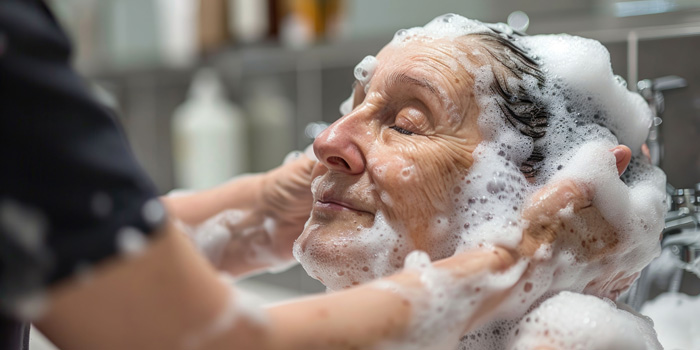Maintaining personal hygiene is more than a daily task. It is a cornerstone of dignity, health, and emotional well-being for seniors. As aging introduces new challenges, caregivers and loved ones must adjust their routines to ensure comfort, safety, and dignity. From bathing and grooming to managing incontinence and skin care, thoughtful hygiene practices can transform daily life.
Bathing: Safety and Simplicity
Bathing can be one of the most vulnerable moments for seniors. Fear of slipping reduced mobility, and temperature sensitivity often lead to resistance. To ease the process:
- Use grab bars, non-slip mats, and shower chairs to reduce fall risk.
- Opt for sponge baths or rinse-free wipes like Welmedix Homecare Pro or Allsett XL Body Wipes for quick refreshes between full baths.
- Keep the bathroom warm and well-lit to enhance comfort and visibility.
Bathing isn’t just about cleanliness—it’s about preserving dignity. A calm, respectful approach makes all the difference.
Incontinence: Managing with Compassion
Incontinence affects millions of older adults and can lead to skin irritation, infections, and emotional distress. Key strategies include:
- Using high-quality absorbent products and changing them promptly.
- Cleaning gently with pH-balanced, rinse-free cleansers like TENA ProSkin Cream to avoid harsh scrubbing.
- Applying moisture barrier creams to protect fragile skin from breakdown.
Caregivers should normalize the conversation around incontinence, removing shame and focusing on solutions.
Grooming: A Boost to Self-Esteem
Regular grooming—haircuts, shaving, nail care — helps seniors feel more like themselves. It’s also a chance to check for skin changes, nail fungus, or oral health issues. Tips:
- Use electric razors to reduce nicking risks.
- Keep nails trimmed and clean to prevent infections.
- Encourage daily oral hygiene with soft-bristle brushes and fluoride toothpaste.
Even small grooming rituals can uplift mood and reinforce identity.
Skin Care: Gentle, Consistent, Protective
Aging skin is thinner, drier, and more prone to tears. Hydration and protection are key:
- Moisturize daily with fragrance-free, hypoallergenic lotions.
- Avoid hot water and harsh soaps—lukewarm water and gentle cleansers are best.
- Check for pressure sores, especially in sedentary seniors, and rotate positions regularly.
Natural remedies like aloe vera or zinc oxide creams can soothe irritation, while products like Balmex or Arnicare offer targeted relief.
Additional Considerations: Hygiene Beyond the Basics
- Foot Care: Inspect feet regularly for sores, fungal infections, or swelling. Use breathable socks and keep toenails trimmed.
- Laundry Hygiene: Wash bedding and clothing frequently with mild detergents to prevent buildup of bacteria and allergens.
- Mental Health: Depression or cognitive decline can impact hygiene habits. Gentle reminders, visual cues, and routine-building help maintain consistency.
Senior hygiene isn’t just about staying clean—it’s about nurturing confidence, preventing illness, and honoring the person behind the routine. With the right tools, empathy, and a touch of humor, caregivers can turn hygiene into a moment of connection and care.

